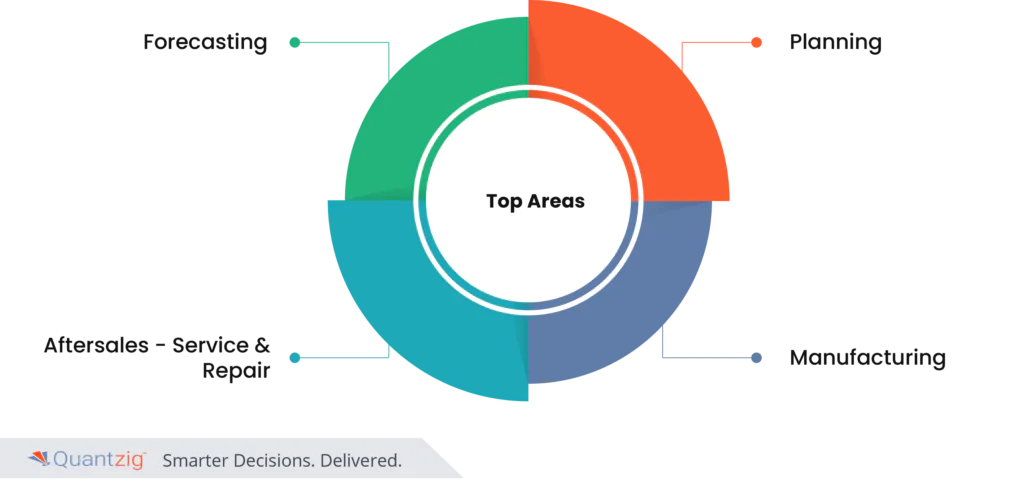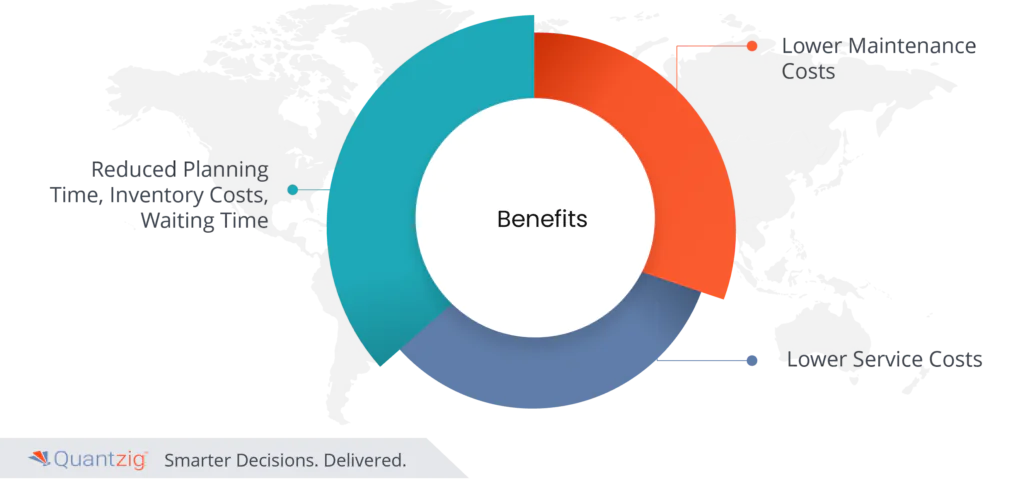As autonomous systems become increasingly prevalent across sectors, so do the complexities of managing risks inherent in AI-driven technologies. These systems, ranging from self-driving cars to automated drones, rely heavily on real-time data processing and machine learning. However, with this autonomy comes an expanded range of risks related to AI safety, AI ethics, AI security, and AI compliance. To responsibly deploy autonomous technologies, companies must adopt proactive AI risk management strategies that prioritize transparency, accountability, and trustworthiness.
Get started with your complimentary trial today and delve into our platform without any obligations. Explore our wide range of customized, consumption driven analytical solutions services built across the analytical maturity levels.
Start your Free TrialTable of Contents
Overview of the Automotive Industry
In the realm of automotive manufacturing, the incorporation of AI technologies is revolutionizing risk mitigation strategies, particularly in the context of agile and dynamic production processes. This entails a holistic approach that aligns manufacturing with market-driven demand forecasting, planning, and assembly in a seamlessly connected and integrated manner. By leveraging AI, automotive manufacturers can adapt swiftly to market demands, ensuring efficiency throughout the entire production lifecycle.
One critical aspect of risk in the automotive industry lies in the potential costs associated with car and key part failures, both during the warranty period for the company and post-warranty for the customer. The implementation of preventive and predictive maintenance emerges as a crucial solution to identify and mitigate these risks effectively. Through advanced analytics and AI-driven predictive maintenance models, risks associated with potential failures can be identified proactively. This allows for timely repairs or part replacements, reducing costs for both the manufacturer, in terms of warranty claims, and the end customer, who benefits from lower repair expenses outside the warranty period. Overall, the integration of AI technologies offers a strategic approach to enhance the reliability and cost-effectiveness of the automotive manufacturing and maintenance processes.
Top Areas of Automotive Industry

1. Forecasting, Planning & Manufacturing:
Agile Manufacturing: AI technologies enable agile and dynamic manufacturing processes aligned with real-time market demand forecasting.
Integrated Planning: Streamlining planning procedures by integrating AI-driven insights into manufacturing processes ensures a responsive and market-driven approach.
Connected Assembly: AI facilitates a connected and integrated assembly line, optimizing efficiency and adaptability to varying production requirements.
2. AfterSale – Service & Repair:
Preventive Maintenance: AI-driven preventive maintenance strategies identify potential risks, allowing for timely intervention and minimizing the likelihood of car and part failures.
Predictive Maintenance: Utilizing AI for predictive maintenance enhances risk mitigation by forecasting potential failures, enabling proactive repairs or replacements.
Cost Reduction: Early identification of risks through AI-led maintenance translates to cost savings for both manufacturers, in terms of warranty claims, and customers, by reducing post-warranty repair expenses.
In summary, AI technologies play a pivotal role in mitigating risks across the automotive industry, spanning from agile manufacturing processes to advanced maintenance strategies in the post-sale phase.
Key Risks in Autonomous Systems
Effectively managing AI risks requires first understanding the core challenges in autonomous systems:
- Systemic Failures and Safety Risks
Autonomous technologies operating in high-stakes environments, such as healthcare and transportation, face inherent AI system safety risks. Even small algorithmic missteps can result in severe accidents, underscoring the need for robust AI safety protocols. - Data Security and Privacy Concerns
Autonomous systems gather vast data, exposing them to cybersecurity threats. Safeguarding data through AI privacy protection and AI security measures helps prevent data breaches that could endanger user safety and trust. - Algorithmic Bias and Ethical Implications
Without careful oversight, AI systems risk incorporating biases from their training data, leading to potential AI discrimination. Ensuring AI bias mitigation and adhering to ethical approaches to AI risk mitigation are essential to prevent unfair decision-making, especially in sectors like finance and law enforcement. - Legal and Regulatory Risks
Regulatory standards for AI-driven autonomous systems are still emerging, making AI compliance a complex issue. Non-compliance can result in legal liabilities, emphasizing the need for proactive AI risk assessment and control frameworks.
Benefits
Incorporating AI technologies into the automotive sector brings forth a spectrum of benefits that significantly contribute to risk mitigation and operational efficiency.

- Reduced Planning Time, Inventory Costs, Waiting Time:
AI-driven forecasting and planning streamline the manufacturing process, resulting in reduced planning time. By precisely predicting market demand, manufacturers can optimize inventory levels, minimizing excess stock and associate holding costs. Additionally, the agile and connected manufacturing facilitated by AI reduces waiting times, ensuring a responsive and efficient production cycle.
- Lower Maintenance and Service Costs:
AI technologies revolutionize maintenance strategies, shifting from reactive to proactive models. Predictive and preventive maintenance, enabled by AI algorithms, identify potential issues before they escalate, leading to lower maintenance costs. This not only benefits manufacturers during the warranty period but also reduces service costs for customers post-warranty, fostering a more sustainable and cost-effective ownership experience.
In essence, the integration of AI in the automotive industry not only enhances risk mitigation but also ushers in cost-effective and streamlined operations, positively impacting both manufacturers and end-users.
What the Future Holds for AI in Automobile Sector
The future of AI technologies in the automotive industry holds promises of advanced streamlining and sophistication, particularly in the realms of personalized manufacturing. The shift towards “Made to Order” or “Assemble to Order” models is anticipated, leveraging AI for accurate production-to-sales floor Service Level Agreements (SLAs). This level of precision ensures a seamless integration between manufacturing and market demands, minimizing lead times and optimizing inventory.
Additionally, automated remote services are poised to redefine post-sales support. Through AI-driven car diagnostics and real-time issue resolution, manufacturers can remotely address maintenance needs. This not only enhances customer satisfaction by providing swift solutions but also contributes to a proactive approach to mitigating potential risks. The convergence of AI and automotive technology is set to reshape the industry, ushering in an era of unparalleled efficiency and customer-centric services.
How Quantzig Can Help Manage AI Risks in Autonomous Systems
Quantzig offers end-to-end AI risk management solutions that address the multifaceted risks associated with autonomous systems. By leveraging expertise in AI governance, AI safety, AI transparency, and AI accountability, Quantzig empowers organizations to deploy autonomous technologies confidently and responsibly. Here’s how Quantzig’s solutions support AI risk management:
- AI Risk Management Strategies
Quantzig provides comprehensive AI risk management strategies tailored to your industry, helping you identify, assess, and mitigate risks in autonomous systems. Our experts work closely with your team to establish a custom AI risk framework that addresses operational safety, bias mitigation, and security. - Ethical Approaches to AI Risk Mitigation
To ensure fairness and transparency, Quantzig designs ethical AI risk mitigation strategies that prioritize AI ethics and AI trustworthiness. By implementing these protocols, we help organizations foster responsible AI adoption while adhering to regulatory and ethical standards. - AI Bias Mitigation and Discrimination Prevention
Quantzig’s expertise in mitigating bias and discrimination in AI systems helps organizations identify and eliminate biases within their algorithms. This safeguards against unfair outcomes, building AI trustworthiness and protecting against discrimination risks in automated decision-making. - AI Safety Protocols and Security Frameworks
Through tailored AI safety protocols for organizations, Quantzig helps enhance operational reliability. Our AI security frameworks incorporate robust privacy protection measures, ensuring that data processed by autonomous systems is safeguarded from cyber threats. - Generative AI Risk Assessment and Control
For organizations utilizing Generative AI, Quantzig offers targeted risk assessment and control frameworks to address unique challenges, including intellectual property risks, data privacy concerns, and content security. - Regulatory Compliance and AI Accountability
Quantzig’s solutions extend to AI regulation and risk mitigation techniques that help organizations navigate evolving AI laws. By establishing AI transparency and AI accountability mechanisms, we ensure organizations can demonstrate compliance and responsible AI deployment practices.
Book a demo to experience the meaningful insights we derive from data through our analytical tools and platform capabilities. Schedule a demo today!
Request a Free DemoThe Path Forward with Quantzig
As autonomous systems reshape industries, a proactive approach to AI risk management is essential. Quantzig’s solutions provide comprehensive support across AI governance, AI privacy protection, AI bias mitigation, and AI compliance. By partnering with Quantzig, organizations can confidently deploy autonomous systems that are safe, secure, and ethically aligned with industry standards. Our AI risk management frameworks not only help mitigate risks but also build a foundation of trustworthiness and transparency—paving the way for responsible, scalable AI adoption.
Experience the advantages firsthand by testing a customized complimentary pilot designed to address your specific requirements. Pilot studies are non-committal in nature.
Request a Free PilotConclusion:
In conclusion, the integration of AI technologies in the automotive industry heralds a transformative era in risk mitigation. From streamlining manufacturing processes and forecasting to enhancing after-sale services, AI stands as a powerful ally in optimizing efficiency and reducing costs. The future holds promise of advanced levels of sophistication, personalized production, and automated remote services. With a projected 40% CAGR in AI adoption and the potential to drive sales while minimizing maintenance costs, the automotive landscape is poised for a revolutionary shift. Embracing AI is not just a strategy for risk mitigation but a pathway to unprecedented innovation and resilience in the dynamic automotive ecosystem.



